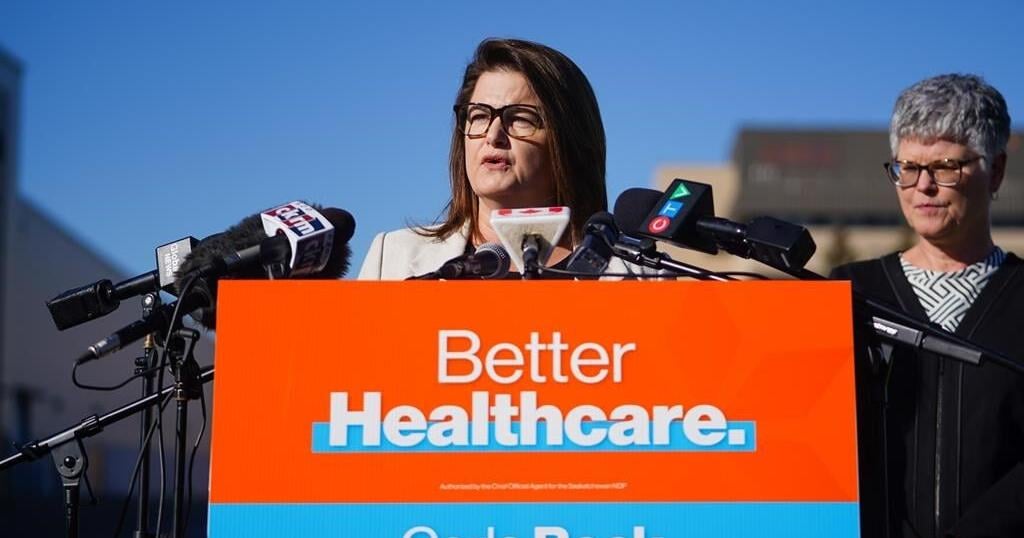SASKATOON – Saskatchewan’s two main party leaders were on the campaign trail Wednesday addressing health care, with Carla Beck’s NDP promising to get emergency rooms back on track while Scott Moe’s Saskatchewan Party proposed expanding coverage for diabetics.
Beck told reporters in Saskatoon she would hire more full-time staff, extend the hours of Saskatoon City Hospital and modernize legislation to get paramedics out of waiting rooms if she’s elected on Oct. 28.
She has also promised an online dashboard to inform the public when there are unplanned emergency room closures.
“Things are even worse than they have ever been, and we’re simply at a breaking point,” said Beck, whose plan is pegged to cost $1 billion over four years.
“We have people in this province dying for care, people being left on beds in hallways because there is simply no room for them in our overcrowded emergency rooms, and frontline workers burning out and leaving the province or leaving the profession altogether.”
Beck pointed to a memo that says the Royal University Hospital in Saskatoon broke occupational health and safety rules last week, where the emergency room was over capacity with no protocols in place to control the situation.
The memo says there were beds and chairs in hallways and around nursing stations. Patients were also doubled up in small rooms, which blocked entryways for staff to move freely.
It also says the lack of space made it difficult for workers to administer care, causing them to compromise their posture.
“In the nursing desk areas, patients are lined up all around the desk minimizing workers abilities to safely position themselves in non-compromised postures, such as hip flexion while twisting, shoulder abduction and flexion, to name a few that were observed,” it says.
Beck said Scott Moe’s Saskatchewan Party has refused to admit there’s a problem.
“We simply have to change this. We have to get Saskatchewan out of last place. And I commit to you, we will,” Beck said.
The Saskatchewan Health Authority (SHA) said in an email it’s working to address pressures.
It said hospitals in Saskatoon have seen on average 400 presentations per day, with an average of 116 patients each day requiring admission into acute care.
Last year, Regina’s two hospitals broke the fire code due to patients crowding hallways.
Moe told reporters in Saskatoon if re-elected he would expand a health-care plan he announced two years ago to hire more workers.
He said the plan has already hired about 1,400 nurses over the last 18 months.
“And we need to make that plan even more ambitious than it is today to ensure that we are decreasing any of the disruptions that we are seeing wherever they might be,” Moe said.
He took aim at the NDP for not being forthright with how much their plan would cost the province.
Also Wednesday, Moe promised to extend coverage for insulin pumps and diabetes supplies to seniors and young adults.
It would see young adults up to the age of 25 and seniors aged 65 and older receive continuous and flash glucose monitors at no cost.
Children and youth under age 18 currently receive such coverage for free in the province.
Moe said glucose monitoring can help improve quality of life. He added about 9,000 seniors and 700 young adults are expected to benefit from the proposed extension.
Also at that announcement, Saskatchewan Party candidate David Buckingham repeated his apology for saying a racial slur a year ago in the government caucus office.
Buckingham stood near Moe, telling reporters it was a “very dumb mistake.”
This report by The Canadian Press was first published Oct. 9, 2024.
